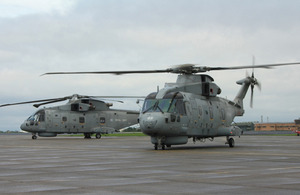Merlins' arrival boosts Navy Olympic role
Royal Navy Merlins from 814 Naval Air Squadron have arrived at Royal Naval Air Station Yeovilton in preparation for their key role in contributing to maritime security operations in support of the Dorset Police.

Royal Navy Merlins from 814 Naval Air Squadron at RNAS Yeovilton [Picture: Crown Copyright/MOD 2012]
The squadron’s personnel, usually based at Royal Naval Air Station (RNAS) Culdrose in Cornwall, have been preparing for their Olympics role for many months, and have already taken part in a series of demanding training missions, working alongside other Royal Navy and Royal Marines units and other government agencies.
In addition to conducting maritime surveillance in the Weymouth Bay area, 814 Naval Air Squadron crews, known as the ‘Flying Tigers’, will be on call to respond to any incident as directed by Maritime Force Commander Dorset, the Commanding Officer of HMS Bulwark.
The Merlin Mk1 is the world’s most potent submarine-hunting helicopter, using state-of-the-art active sonar and passive sonobuoys, but is equally adept at a broad range of traditional maritime helicopter duties such as sea surveillance, search and rescue, and the transfer of passengers and equipment.
More specialist roles have also been added since the aircraft entered front line service in 2000, most notably maritime sniping, fast-roping, and intelligence, surveillance, target acquisition and reconnaissance. This combination of capabilities has made the Merlin Mk1 the aircraft of choice for this particular element of the Fleet Air Arm’s support to the Olympics security plan.
The Commanding Officer of 814 Naval Air Squadron, Commander Christopher Stock, said:
A lot of hard work has gone on behind the scenes by both my engineers and aircrew over many months to ensure aircraft and flying crews are ready for Op Olympics.
The Squadron has been liaising very closely with the police and other agencies, and conducted a comprehensive and dedicated work-up package so that the Flying Tigers can contribute to a safe and secure Olympic and Paralympic Games.
The Merlins will be based out of RNAS Yeovilton for the duration of the Olympic and Paralympic Games and fly to and from HMS Bulwark, which is positioned in Weymouth Bay close to the Olympic Sailing Regatta. The move from Culdrose enables them to utilise the facilities available at the Somerset base and be closer to their operating areas.
Away from RNAS Yeovilton the Royal Navy is carrying out the following duties:
- HMS Bulwark is providing an afloat headquarters in Weymouth Bay, operating helicopters, landing craft and small boats while offering the Police a comprehensive communications and situational awareness facility.
- HMS Ocean is stationed in the Thames acting as a base for the air security helicopters flown by the Fleet Air Arm and Army Air Corps.
- 539 ASRM will provide fast craft with armed Royal Marine detachments onboard, able to respond rapidly to any water-borne threat. This deterrent provides crucial reassurance to the public and athletes that security has the highest priority.
- 1 AGRM will provide fast craft in Weymouth with armed RM detachments on board and an Amphibious Operations Sqn co-ordinating boat movement in the Portland area.
- 4ASRM and 43 Cdo will provide Maritime/Stop security ability.
- P2000 patrol ships will be based at Weymouth and on the Thames.
- Helicopters from 854 Sqn, 815 Sqn and 814 Sqn will be based at RAF Northolt, HMS Ocean and HMS Bulwark, while naval specialists will provide Explosive Ordinance Disposal teams.
- The Royal Fleet Auxiliary will be at the fore of logistic support with RFA MountsBay in Portland Harbour.
- More than 700 individuals from regular and reserve forces will help with venue security, such as personnel and vehicle searches and security patrols.
- 25 per cent of the deployable Naval Service Reserves have been mobilised to support the Olympics.
- Personnel have been selected to raise the Flags at the Opening and Closing Ceremonies and at the Victory Ceremonies, while the Royal Marine Band Service are playing at various Olympic venues.
- The Royal Navy has also been involved in the Torch relay since the arrival of the Olympic Flame at RNAS Culdrose in May, with Service personnel carrying the torch and units engaging along the route. The Royal Navy is working alongside the Army and the RAF to support the Home Office and ensure a successful sporting and cultural Games, as well as carrying out standing commitments throughout the world during the Olympics period.